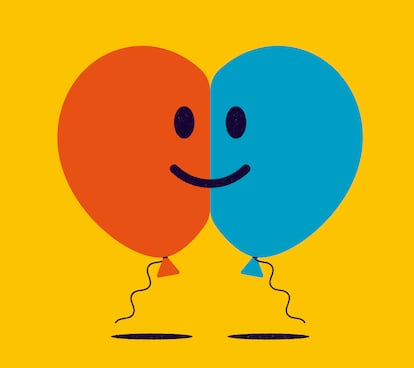What makes us happy? Spoiler alert: it’s not money
A study from Harvard University spanning eight decades seeks to answer the main question that shapes our lives

The book The Good Life: Lessons from the World’s Longest Scientific Study of Happiness compiles the findings of the Harvard Study of Adult Development, the most comprehensive investigation ever done on happiness. Started in 1938 by Harvard University and continuing to this day, the study attempts to answer the question: what makes us happy?
To gain a better understanding of happiness, researchers tracked the same individuals and their families over 80 years. According to the book, written by Robert Waldinger and Marc Schulz, 76% of the millennials interviewed about their life goals in 2007 listed “getting rich” as a top priority, while half of them included “becoming famous” among their main objectives.
The answers provided by these same people 10 years later, now as adults, are interesting. While the desire for fame had moved down the list, money was still an important topic, albeit with some nuances. In addition to aspiring to a successful professional career, many interviewees associated happiness with a debt-free life. Desiring this, after wanting to be rich, is quite the reality check.
It should be noted that this lengthy study focused largely on the white male population of Boston. The value of the investigation lies in the fact that the subjects updated their information regularly; this revealed how different life circumstances, as well as the personal habits, affect our well-being and happiness.
Analyzing data from over eight decades, the researchers found that what has been proven to bring lasting happiness is neither money nor professional success; neither exercise nor diet, although they certainly contribute to our well-being.
The number one factor of happiness, according to the study, is having good relationships. Those with a more intimate connection to family, friends and community are happier — and also in better health.
To measure the quality of the relationships, the 1989 Harvard questionnaire asked the participants to think about their 10 best friends — not counting family and close relatives — and contemplate how they would fall into the following three categories: intimate (whom they share their joys and sorrows with), colleagues (people they interact with frequently, based on shared interests) or occasional (they don’t expressly seek each other out). The participants who proved to be the happiest over time were the ones who cultivated the first category of friends.
Curiously, during our teenage years and early youth we tend to take great care of our close friends, which may be one of the reasons why we look back on that time with nostalgia. As we assume adult responsibilities, friendships are relegated to second or third place. Work and other commitments end up taking over. Then, we simply have “no time” for such an important activity.
All friends have benefits, the authors of the book explain. Friends can give us a hand when we’re down, provide us with an important connection to our own history and, perhaps most important of all, make us laugh. Sometimes there is nothing as beneficial for our health as having a good time, they point out.
Our need for quality human connections has been central to the evolution and survival of our species, Waldinger and Schulz note. Since we were hunter-gatherers, having a tribe of our own has provided us with protection from the dangers of life. In current times, those dangers could include the mood disorders that affect a large part of the population.
It is never too late to be happy, as long as we fill our lives with good relationships and prioritize them over many other obligations and commitments. This will be our best investment because, as the Harvard study shows, those who have no time for friends have no time for happiness.
Francesc Miralles is a writer and journalist who is an expert in psychology.
Tu suscripción se está usando en otro dispositivo
¿Quieres añadir otro usuario a tu suscripción?
Si continúas leyendo en este dispositivo, no se podrá leer en el otro.
FlechaTu suscripción se está usando en otro dispositivo y solo puedes acceder a EL PAÍS desde un dispositivo a la vez.
Si quieres compartir tu cuenta, cambia tu suscripción a la modalidad Premium, así podrás añadir otro usuario. Cada uno accederá con su propia cuenta de email, lo que os permitirá personalizar vuestra experiencia en EL PAÍS.
¿Tienes una suscripción de empresa? Accede aquí para contratar más cuentas.
En el caso de no saber quién está usando tu cuenta, te recomendamos cambiar tu contraseña aquí.
Si decides continuar compartiendo tu cuenta, este mensaje se mostrará en tu dispositivo y en el de la otra persona que está usando tu cuenta de forma indefinida, afectando a tu experiencia de lectura. Puedes consultar aquí los términos y condiciones de la suscripción digital.








































